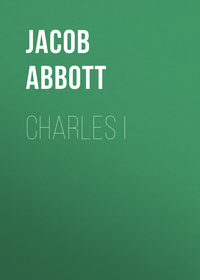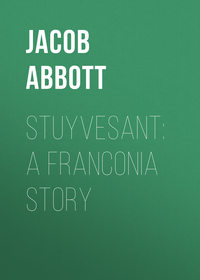
Cleopatra
Antony then ordered the fleet to move forward to the island of Samos. Here it was brought to anchor and remained for some time, waiting for the coming in of new re-enforcements, and for the completion of the other arrangements. Antony, as if becoming more and more infatuated as he approached the brink of his ruin, spent his time while the expedition remained at Samos, not in maturing his plans and perfecting his arrangements for the tremendous conflict which was approaching, but in festivities, games, revelings, and every species of riot and dissolute excess. This, however, is not surprising. Men almost always, when in a situation analogous to his, fly to similar means of protecting themselves, in some small degree, from the pangs of remorse, and from the forebodings which stand ready to terrify and torment them at every instant in which these gloomy specters are not driven away by intoxication and revelry. At least Antony found it so. Accordingly, an immense company of players, tumblers, fools, jesters, and mountebanks were ordered to assemble at Samos, and to devote themselves with all zeal to the amusement of Antony's court. The island was one universal scene of riot and revelry. People were astonished at such celebrations and displays, wholly unsuitable, as they considered them, to the occasion. If such are the rejoicings, said they, which Antony celebrates before going into the battle, what festivities will he contrive on his return, joyous enough to express his pleasure if he shall gain the victory?
After a time, Antony and Cleopatra, with a magnificent train of attendants, left Samos, and, passing across the Aegean Sea, landed in Greece, and advanced to Athens, while the fleet, proceeding westward from Samos, passed around Taenarus, the southern promontory of Greece, and then moved northward along the western coast of the peninsula. Cleopatra wished to go to Athens for a special reason. It was there that Octavia had stopped on her journey toward her husband with re-enforcements and aid; and while she was there, the people of Athens, pitying her sad condition, and admiring the noble spirit of mind which she displayed in her misfortunes, had paid her great attention, and during her stay among them had bestowed upon her many honors. Cleopatra now wished to go to the same place, and to triumph over her rival there, by making so great a display of her wealth and magnificence, and of her ascendency over the mind of Antony, as should entirely transcend and outshine the more unassuming pretensions of Octavia. She was not willing, it seems, to leave to the unhappy wife whom she had so cruelly wronged even the possession of a place in the hearts of the people of this foreign city, but must go and enviously strive to efface the impression which injured innocence had made, by an ostentatious exhibition of the triumphant prosperity of her own shameless wickedness. She succeeded well in her plans. The people of Athens were amazed and bewildered at the immense magnificence that Cleopatra exhibited before them. She distributed vast sums of money among the people. The city, in return, decreed to her the most exalted honors. They sent a solemn embassy to her to present her with these decrees. Antony himself, in the character of a citizen of Athens, was one of the embassadors. Cleopatra received the deputation at her palace. The reception was attended with the most splendid and imposing ceremonies.
One would have supposed that Cleopatra's cruel and unnatural hostility to Octavia might now have been satisfied; but it was not. Antony, while he was at Athens, and doubtless at Cleopatra's instigation, sent a messenger to Rome with a notice of divorcement to Octavia, and with an order that she should leave his house. Octavia obeyed. She went forth from her home, taking the children with her, and bitterly lamenting her cruel destiny.
In the mean time, while all these events had been transpiring in the East, Octavius had been making his preparations for the coming crisis, and was now advancing with a powerful fleet across the sea. He was armed with authority from the Roman Senate and people, for he had obtained from them a decree deposing Antony from his power. The charges made against him all related to misdemeanors and offenses arising out of his connection with Cleopatra. Octavius contrived to get possession of a will which Antony had written before leaving Rome, and which he had placed there in what he supposed a very sacred place of deposit. The custodians who had it in charge replied to Octavius, when he demanded it, that they would not give it to him, but if he wished to take it they would not hinder him. Octavius then took the will, and read it to the Roman Senate. It provided, among other things, that at his death, if his death should happen at Rome, his body should be sent to Alexandria to be given to Cleopatra; and it evinced in other ways a degree of subserviency and devotedness to the Egyptian queen which was considered wholly unworthy of a Roman chief magistrate. Antony was accused, too, of having plundered cities and provinces, to make presents to Cleopatra; of having sent a library of two hundred thousand volumes to her from Pergamus, to replace the one which Julius Caesar had accidentally burned; of having raised her sons, ignoble as their birth was, to high places of trust and power in the Roman government, and of having in many ways compromised the dignity of a Roman officer by his unworthy conduct in reference to her. He used, for example, when presiding at a judicial tribunal, to receive love-letters sent him from Cleopatra, and then at once turn off his attention from the proceedings going forward before him to read the letters.4
Sometimes he did this when sitting in the chair of state, giving audience to embassadors and princes. Cleopatra probably sent these letters in at such times under the influence of a wanton disposition to show her power. At one time, as Octavius said in his arguments before the Roman Senate, Antony was hearing a cause of the greatest importance, and during a time in the progress of the cause when one of the principal orators of the city was addressing him, Cleopatra came passing by, when Antony suddenly arose, and, leaving the court without any ceremony, ran out to follow her. These and a thousand similar tales exhibited Antony in so odious a light, that his friends forsook his cause, and his enemies gained a complete triumph. The decree was passed against him, and Octavius was authorized to carry it into effect; and accordingly, while Antony, with his fleet and army, was moving westward from Samos and the Aegean Sea, Octavius was coming eastward and southward down the Adriatic to meet him.
In process of time, after various maneuvers and delays, the two armaments came into the vicinity of each other at a place called Actium, which will be found upon the map on the western coast of Epirus, north of Greece. Both of the commanders had powerful fleets at sea, and both had great armies upon the land. Antony was strongest in land troops, but his fleet was inferior to that of Octavius, and he was himself inclined to remain on the land and fight the principal battle there. But Cleopatra would not consent to this. She urged him to give Octavius battle at sea. The motive which induced her to do this has been supposed to be her wish to provide a more sure way of escape in case of an unfavorable issue to the conflict. She thought that in her galleys she could make sail at once across the sea to Alexandria in case of defeat, whereas she knew not what would become of her if beaten at the head of an army on the land. The ablest counselors and chief officers in the army urged Antony very strongly not to trust himself to the sea. To all their arguments and remonstrances, however, Antony turned a deaf ear. Cleopatra must be allowed to have her way. On the morning of the battle, when the ships were drawn up in array, Cleopatra held the command of a division of fifty or sixty Egyptian vessels, which were all completely manned, and well equipped with masts and sails. She took good care to have every thing in perfect order for flight, in case flight should prove to be necessary. With these ships she took a station in reserve, and for a time remained there a quiet witness of the battle. The ships of Octavius advanced to the attack of those of Antony, and the men fought from deck to deck with spears, boarding-pikes, flaming darts, and every other destructive missile which the military art had then devised. Antony's ships had to contend against great disadvantages. They were not only outnumbered by those of Octavius, but were far surpassed by them in the efficiency with which they were manned and armed. Still, it was a very obstinate conflict. Cleopatra, however, did not wait to see how it was to be finally decided. As Antony's forces did not immediately gain the victory, she soon began to yield to her fears in respect to the result, and, finally, fell into a panic and resolved to fly. She ordered the oars to be manned and the sails to be hoisted, and then forcing her way through a portion of the fleet that was engaged in the contest, and throwing the vessels into confusion as she passed, she succeeded in getting to sea, and then pressed on, under full sail, down the coast to the southward. Antony, as soon as he perceived that she was going, abandoning every other thought, and impelled by his insane devotedness to her, hastily called up a galley of five banks of oarsmen to pull with all their force after Cleopatra's flying squadron.
Cleopatra, looking back from the deck of her vessel, saw this swift galley pressing on toward her. She raised a signal at the stern of the vessel which she was in, that Antony might know for which of the fifty flying ships he was to steer. Guided by the signal, Antony came up to the vessel, and the sailors hoisted him up the side and helped him in. Cleopatra had, however, disappeared. Overcome with shame and confusion, she did not dare, it seems, to meet the look of the wretched victim of her arts whom she had now irretrievably ruined. Antony did not seek her. He did not speak a word. He went forward to the prow of the ship, and, throwing himself down there alone, pressed his head between his hands, and seemed stunned and stupefied, and utterly overwhelmed with horror and despair.
He was, however, soon aroused from his stupor by an alarm raised on board his galley that they were pursued. He rose from his seat, seized a spear, and, on ascending to the quarter-deck, saw that there were a number of small light boats, full of men and of arms, coming up behind them, and gaining rapidly upon his galley. Antony, now free for a moment from his enchantress's sway, and acting under the impulse of his own indomitable boldness and decision, instead of urging the oarsmen to press forward more rapidly in order to make good their escape, ordered the helm to be put about, and thus, turning the galley around, he faced his pursuers, and drove his ship into the midst of them. A violent conflict ensued, the din and confusion of which was increased by the shocks and collisions between the boats and the galley. In the end, the boats were beaten off, all excepting one: that one kept still hovering near, and the commander of it, who stood upon the deck, poising his spear with an aim at Antony, and seeking eagerly an opportunity to throw it, seemed by his attitude and the expression of his countenance to be animated by some peculiarly bitter feeling of hostility and hate. Antony asked him who he was, that dared so fiercely to threaten him. The man replied by giving his name, and saying that he came to avenge the death of his father. It proved that he was the son of a man whom Antony had at a previous time, on some account or other, caused to be beheaded.
There followed an obstinate contest between Antony and this fierce assailant, in the end of which the latter was beaten off. The boats then, having succeeded in making some prizes from Antony's fleet, though they had failed in capturing Antony himself, gave up the pursuit and returned. Antony then went back to his place, sat down in the prow, buried his face in his hands, and sank into the same condition of hopeless distress and anguish as before.
When husband and wife are overwhelmed with misfortune and suffering, each instinctively seeks a refuge in the sympathy and support of the other. It is, however, far otherwise with such connections as that of Antony and Cleopatra. Conscience, which remains calm and quiet in prosperity and sunshine, rises up with sudden and unexpected violence as soon as the hour of calamity comes; and thus, instead of mutual comfort and help, each finds in the thoughts of the other only the means of adding the horrors of remorse to the anguish of disappointment and despair. So extreme was Antony's distress, that for three days he and Cleopatra neither saw nor spoke to each other. She was overwhelmed with confusion and chagrin, and he was in such a condition of mental excitement that she did not dare to approach him. In a word, reason seemed to have wholly lost its sway—his mind, in the alternations of his insanity, rising sometimes to fearful excitement, in paroxysms of uncontrollable rage, and then sinking again for a time into the stupor of despair.
In the mean time, the ships were passing down as rapidly as possible on the western coast of Greece. When they reached Taenarus, the southern promontory of the peninsula, it was necessary to pause and consider what was to be done. Cleopatra's women went to Antony and attempted to quiet and calm him. They brought him food. They persuaded him to see Cleopatra. A great number of merchant ships from the ports along the coast gathered around Antony's little fleet and offered their services. His cause, they said, was by no means desperate. The army on the land had not been beaten. It was not even certain that his fleet had been conquered. They endeavored thus to revive the ruined commander's sinking courage, and to urge him to make a new effort to retrieve his fortunes. But all was in vain. Antony was sunk in a hopeless despondency. Cleopatra was determined on going to Egypt, and he must go too. He distributed what treasure remained at his disposal among his immediate followers and friends, and gave them advice about the means of concealing themselves until they could make peace with Octavius. Then, giving up all as lost, he followed Cleopatra across the sea to Alexandria.
CHAPTER XII.
THE END OF CLEOPATRA
Infatuation of Antony.—His early character—Powerful influence of Cleopatra over Antony,—Indignation at Antony's conduct.—Plans of Cleopatra.—Antony becomes a misanthrope.—His hut on the island of Pharos—Antony's reconciliation with Cleopatra.—Scenes of revelry.—Cleopatra makes a collection of poisons.—Her experiments with them.—Antony's suspicions.—Cleopatra's stratagem.—The bite of the asp.—Cleopatra's tomb.—Progress of Octavius.—Proposal of Antony.—Octavius at Pelusium.—Cleopatra's treasures.—Fears of Octavius.—He arrives at Alexandria.—The sally.—The unfaithful captain.—Disaffection of Antony's men.—Desertion of the fleet.—False rumor of Cleopatra's death.—Antony's despair.—Eros.—Antony's attempt to kill himself.—Antony taken to Cleopatra.—She refuses to open the door.—Antony taken in at the window.—Cleopatra's grief.—Death of Antony.—Cleopatra made prisoner.—Treatment of Cleopatra.—Octavius takes possession of Alexandria.—Antony's funeral.—Cleopatra's wretched condition.—Cleopatra's wounds and bruises.—She resolves to starve herself.—Threats of Octavius.—Their effect.—Octavius visits Cleopatra.—Her wretched condition.—The false inventory.—Cleopatra in a rage.—Octavius deceived.—Cleopatra's determination.—Cleopatra visits Antony's tomb.—Her composure on her return.—Cleopatra's supper.—The basket of figs.—Cleopatra's letter to Octavius.—She is found dead.—Death of Charmion.—Amazement of the by-standers.—Various conjectures as to the cause of Cleopatra's death.—Opinion of Octavius.—His triumph.
The case of Mark Antony affords one of the most extraordinary examples of the power of unlawful love to lead its deluded and infatuated victim into the very jaws of open and recognized destruction that history records. Cases similar in character occur by thousands in common life; but Antony's, though perhaps not more striking in itself than a great multitude of others have been, is the most conspicuous instance that has ever been held up to the observation of mankind.
In early life, Antony was remarkable, as we have already seen, for a certain savage ruggedness of character, and for a stern and indomitable recklessness of will, so great that it seemed impossible that any thing human should be able to tame him. He was under the control, too, of an ambition so lofty and aspiring that it appeared to know no bounds; and yet we find him taken possession of, in the very midst of his career, and in the height of his prosperity and success, by a woman, and so subdued by her arts and fascinations as to yield himself wholly to her guidance, and allow himself to be led about by her entirely at her will. She displaces whatever there might have been that was noble and generous in his heart, and substitutes therefor her own principles of malice and cruelty. She extinguishes all the fires of his ambition, originally so magnificent in its aims that the world seemed hardly large enough to afford it scope, and instead of this lofty passion, fills his soul with a love of the lowest, vilest, and most ignoble pleasures. She leads him to betray every public trust, to alienate from himself all the affections of his countrymen, to repel most cruelly the kindness and devotedness of a beautiful and faithful wife, and, finally to expel this wife and all of his own legitimate family from his house; and now, at last, she conducts him away in a most cowardly and ignoble flight from the field of his duty as a soldier—he knowing, all the time, that she is hurrying him to disgrace and destruction, and yet utterly without power to break from the control of his invisible chains.
The indignation which Antony's base abandonment of his fleet and army at the battle of Actium excited, over all that part of the empire which had been under his command, was extreme. There was not the slightest possible excuse for such a flight. His army, in which his greatest strength lay, remained unharmed, and even his fleet was not defeated. The ships continued the combat until night, notwithstanding the betrayal of their cause by their commander. They were at length, however, subdued. The army, also, being discouraged, and losing all motive for resistance, yielded too. In a very short time the whole country went over to Octavius's side.
In the mean time, Cleopatra and Antony, on their first return to Egypt, were completely beside themselves with terror. Cleopatra formed a plan for having all the treasures that she could save, and a certain number of galleys sufficient for the transportation of these treasures and a small company of friends, carried across the isthmus of Suez and launched upon the Red Sea, in order that she might escape in that direction, and find some remote hiding-place and safe retreat on the shores of Arabia or India, beyond the reach of Octavius's dreaded power. She actually commenced this undertaking, and sent one or two of her galleys across the isthmus; but the Arabs seized them as soon as they reached their place of destination, and killed or captured the men that had them in charge, so that this desperate scheme was soon abandoned. She and Antony then finally concluded to establish themselves at Alexandria, and made preparation, as well as they could, for defending themselves against Octavius there.
Antony, when the first effects of his panic subsided, began to grow mad with vexation and resentment against all mankind. He determined that he would have nothing to do with Cleopatra or with any of her friends, but went off in a fit of sullen rage, and built a hermitage in a lonely place, on the island of Pharos, where he lived for a time, cursing his folly and his wretched fate, and uttering the bitterest invectives against all who had been concerned in it. Here tidings came continually in, informing him of the defection of one after another of his armies, of the fall of his provinces in Greece and Asia Minor, and of the irresistible progress which Octavius was now making toward universal dominion. The tidings of these disasters coming incessantly upon him kept him in a continual fever of resentment and rage.
At last he became tired of his misanthropic solitude, a sort of reconciliation ensued between himself and Cleopatra, and he went back again to the city. Here he joined himself once more to Cleopatra, and, collecting together what remained of their joint resources, they plunged again into a life of dissipation and vice, with the vain attempt to drown in mirth and wine the bitter regrets and the anxious forebodings which filled their souls. They joined with them a company of revelers as abandoned as themselves, and strove very hard to disguise and conceal their cares in their forced and unnatural gayety. They could not, however, accomplish this purpose. Octavius was gradually advancing in his progress, and they knew very well that the time of his dreadful reckoning with them must soon come; nor was there any place on earth in which they could look with any hope of finding a refuge in it from his vindictive hostility.
Cleopatra, warned by dreadful presentiments of what would probably at last be her fate, amused herself in studying the nature of poisons—not theoretically, but practically—making experiments with them on wretched prisoners and captives whom she compelled to take them in order that she and Antony might see the effects which they produced. She made a collection of all the poisons which she could procure, and administered portions of them all, that she might see which were sudden and which were slow in their effects, and also learn which produced the greatest distress and suffering, and which, on the other hand, only benumbed and stupefied the faculties, and thus extinguished life with the least infliction of pain. These experiments were not confined to such vegetable and mineral poisons as could be mingled with the food or administered in a potion. Cleopatra took an equal interest in the effects of the bite of venomous serpents and reptiles. She procured specimens of all these animals, and tried them upon her prisoners, causing the men to be stung and bitten by them, and then watching the effects. These investigations were made, not directly with a view to any practical use, which she was to make of the knowledge thus acquired, but rather as an agreeable occupation, to divert her mind, and to amuse Antony and her guests. The variety in the forms and expressions which the agony of her poisoned victims assumed,—their writhings, their cries, their convulsions, and the distortions of their features when struggling with death, furnished exactly the kind and degree of excitement which she needed to occupy and amuse her mind.
Antony was not entirely at ease, however, during the progress of these terrible experiments. His foolish and childish fondness for Cleopatra was mingled with jealousy, suspicion, and distrust; and he was so afraid that Cleopatra might secretly poison him, that he would never take any food or wine without requiring that she should taste it before him. At length, one day, Cleopatra caused the petals of some flowers to be poisoned, and then had the flowers woven into the chaplet which Antony was to wear at supper. In the midst of the feast, she pulled off the leaves of the flowers from her own chaplet and put them playfully into her wine, and then proposed that Antony should do the same with his chaplet, and that they should then drink the wine, tinctured, as it would be, with the color and the perfume of the flowers. Antony entered very readily into this proposal, and when he was about to drink the wine, she arrested his hand, and told him that it was poisoned. "You see now," said she, "how vain it is for you to watch against me. If it were possible for me to live without you, how easy it would be for me to devise ways and means to kill you." Then, to prove that her words were true, she ordered one of the servants to drink Antony's wine. He did so, and died before their sight in dreadful agony.
The experiments which Cleopatra thus made on the nature and effects of poison were not, however, wholly without practical result. Cleopatra learned from them, it is said, that the bite of the asp was the easiest and least painful mode of death. The effect of the venom of that animal appeared to her to be the lulling of the sensorium into a lethargy or stupor, which soon ended in death, without the intervention of pain. This knowledge she seems to have laid up in her mind for future use.









